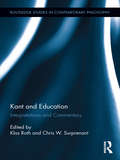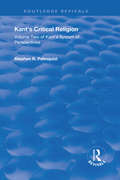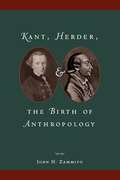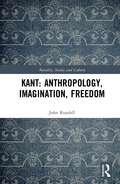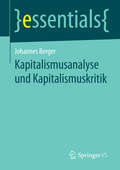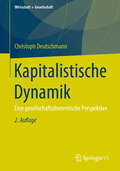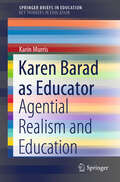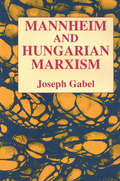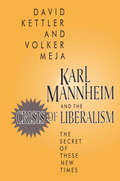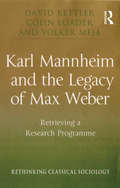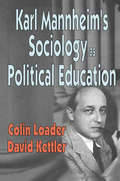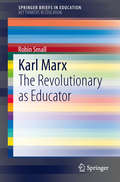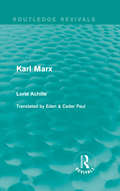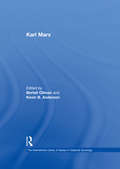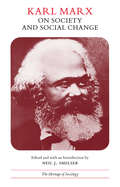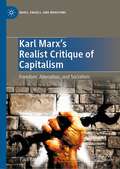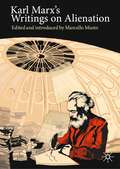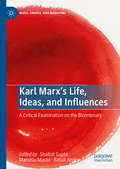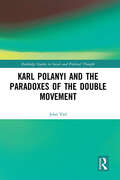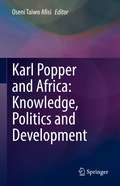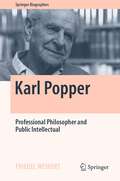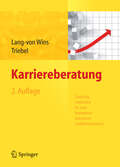- Table View
- List View
Kant and Education: Interpretations and Commentary (Routledge Studies in Contemporary Philosophy)
by Chris W. Surprenant Klas RothImmanuel Kant’s moral philosophy, political philosophy, and philosophy of judgement have been and continue to be widely discussed among many scholars. The impact of his thinking is beyond doubt and his ideas continue to inspire and encourage an on-going dialogue among many people in our world today. Given the historical and philosophical significance of Kant’s moral, political, and aesthetic theory, and the connection he draws between these theories and the appropriate function and methodology of education, it is surprising that relatively little has been written on Kant’s contribution to education theory. Recently, however, internationally recognized Kant scholars such as Paul Guyer, Manfred Kuehn, Richard Velkley, Robert Louden, Susan Shell, and others have begun to turn their attention to Kant’s writings on education and the role of education in cultivating moral character. Kant and Education: Interpretations and Commentary has gathered these scholars together with the aim of filling this perceived void in Kant scholarship. All of the essays contained within this volume will examine either Kant’s ideas on education through an historical analysis of his texts; or the importance and relevance of his moral philosophy, political philosophy, and/or aesthetics in contemporary education theory (or some combination).
Kant's Critical Religion: Volume Two of Kant's "System of Perspectives" (Routledge Revivals)
by Stephen R. PalmquistThis title was first published in 2000. Applying the new perspectival method of interpreting Kant he expounded in earlier works, Palmquist examines a broad range of Kant's philosophical writings to present a fresh view of his thought on theology, religion, and religious experience.
Kant, Herder, and the Birth of Anthropology
by John H. ZammitoIf Kant had never made the "critical turn" of 1773, would he be worth more than a paragraph in the history of philosophy? Most scholars think not. But in this pioneering book, John H. Zammito challenges that view by revealing a precritical Kant who was immensely more influential than the one philosophers think they know. Zammito also reveals Kant's former student and latter-day rival, Johann Herder, to be a much more philosophically interesting thinker than is usually assumed and, in many important respects, historically as influential as Kant. Relying on previously unexamined sources, Zammito traces Kant's friendship with Herder as well as the personal tensions that destroyed their relationship. From this he shows how two very different philosophers emerged from the same beginnings and how, because of Herder's reformulation of Kant, anthropology was born out of philosophy. Shedding light on an overlooked period of philosophical development, this book is a major contribution to the history of philosophy and the social sciences, and especially to the history of anthropology.
Kant: Anthropology Imagination Freedom (Morality, Society and Culture)
by John RundellIn a new reading of Immanuel Kant’s work, this book interrogates his notions of the imagination and anthropology, identifying these – rather than the problem of reason – as the two central pivoting orientations of his work. Such an approach allows a more complex understanding of his critical-philosophical program to emerge, which includes his accounts of reason, politics and freedom as well as subjectivity and intersubjectivity, or sociabilities. Examining Kant’s theorisation of the complexity of our phenomenological existence, the author explores his transcendental move that includes reason and understanding whilst emphasising the importance of the faculty of the imagination to undergird both, before moving to consider Kant’s pluralised, transcendental notion of freedom. This outstanding book will appeal to scholars with interests in philosophy, politics, anthropology and sociology, working on questions of imagination, reason, subjectivities and human freedom.
Kapitalismus, Herrschaft und Max Weber. Ausgewählte Aufsätze: Herausgegeben von Steffen Sigmund (Studien zum Weber-Paradigma)
by Guenther RothGuenther Roths vielfältige Arbeiten sind mit dem Werk Max Webers untrennbar verknüpft. Seine textgenaue und präzise Übersetzung von Wirtschaft und Gesellschaft ins Englische eröffnete ganz neue Chancen zu einer systematischen Auseinandersetzung mit Weber in der angelsächsischen Welt, seine detaillierten und historisch genauen Untersuchungen der Kontexte und der familiären Konstellationen, in die Weber eingebunden war, ermöglichen ein zeit- und milieusensibles Verständnis seiner Biographie und seine differenzierten makrosoziologischen Untersuchungen zu Herrschaft, Politik und Kapitalismus machen das analytische Potential dieses Ansatzes deutlich.Der vorliegende Band versammelt zentrale Texte von Guenther Roth. Sie sind soziologiegeschichtlich bedeutsam und für aktuelle Problemstellungen aufschlussreich. Sie zeigen, wie ein Anschluss an Webers Werk in historischer und systematischer Hinsicht neue Perspektivieren eröffnen kann und machen die Fruchtbarkeit des Weber Paradigmas für aktuelle Fragestellungen deutlich.
Kapitalismusanalyse und Kapitalismuskritik (essentials)
by Johannes BergerDer Kapitalismus, so hat Schumpeter gesagt, ist eine,,Maschine der Massenproduktion, was unvermeidlich auch Produktion für die Massen bedeutet. " Was immer man von diesem System halten mag: Kein anderes Wirtschaftssystem löst die Aufgabe, die Bevölkerung mit immer mehr und ständig neuen Konsumgütern zu versorgen, besser. Wie es aussieht, ist die Wohlstandsmehrung jedoch begleitet von materieller Ungleichheit, in ihrer Höhe schwankender Arbeitslosigkeit und ständig wiederkehrenden Wirtschaftskrisen. Zunächst wendet sich der Artikel den Grundzügen des modernen Kapitalismus zu. In einem zweiten Schritt wird dann der Gestaltwandel des Kapitalismus thematisiert. Im Anschluss daran wird die vielstimmige Kritik an diesem Wirtschaftssystem untersucht. Sie ist nicht nur Sozialkritik, sondern immer auch Kulturkritik gewesen. Der Beitrag schließt mit einem Ausblick auf die Zukunft dieses Wirtschaftssystems und skizziert denkbare, aber unwahrscheinliche Reformen, deren Verwirklichung in eine Wirtschaftsform jenseits der bestehenden führen würde.
Kapitalistische Dynamik: Eine gesellschaftstheoretische Perspektive (Wirtschaft + Gesellschaft)
by Christoph DeutschmannDer Band fasst die neueren Publikationen sowie einige Originalbeiträge des Autors zur Arbeits- und Wirtschaftssoziologie zusammen, in denen eine gesellschaftstheoretische Interpretation kapitalistischer Dynamik entwickelt wird. Zentrale Themen sind die Wahlverwandtschaft zwischen Kapitalismus und Religion und der daraus abgeleitete dynamische Ansatz der Analyse wirtschaftlicher Institutionen. Darüber hinaus geht es darum, diesen Ansatz für die Erklärung aktueller Transformationsprozesse der Arbeitswelt und der Finanzmärkte fruchtbar zu machen.
Karen Barad as Educator: Agential Realism and Education (SpringerBriefs in Education)
by Karin MurrisThis book is about becoming touched and moved by Karen Barad’s agential realism. Karen Barad as Educator is not biographical. It is not about Barad. There is much to be learned about teaching and education research through the human and other-than-human narrative characters in Barad’s writings and way of life. Reading this book is about becoming entangled with, and being inspired by, a passionate yearning for a radical reconfiguration of education in all its settings and phases (e.g., day-care centres, schools, colleges, universities, but also homes, museums or therapy rooms). This book will appeal to lecturers, teachers, artists, therapists, parents and grandparents, funders of education research, organisers of educational events, as well as detached youth workers. In short, this book will speak to anyone interested in the ‘what’ and the ‘how’ of educational encounters and who is interested in alternatives to the dominant neoliberal national curricula, educational policies and humanist teaching, research, and conference agendas. The book aims to offer a gripping account for educators to be inspired by the invigorating and elusive philosophy of agential realism with a specific focus on iterative performative practices that profoundly matter to what counts as knowledge, teaching, learning and response-able education science.
Karl Mannheim and Hungarian Marxism
by Joseph GabelThis remarkable work situates the great Karl Mannheim not only in the Austro-Hungarian empire, but in Hungary and especially in the intellectual fever pitch of pre-war Budapest, with its plethora of revisionist Marxists, anarchists, and intellectuals from a variety of areas who brought radical ideas into the mainstream of biological and social sciences. As Gabel reminds us, Budapest provided a special environment in which the cross-currents of Europe met, and was uniquely devoid of the xenophobia and militarism of so many other parts of Europe.The volume serves as a useful introduction to the force and character of Marxism in Central Europe. Gabel covers not only key figures but major concepts associated with Mannheim and the sociology of knowledge: ideology and false consciousness; the socially unattached intelligentsia; and the utopian conscience. In addition, we are given a tour of the work of Mannheim as seen in Germany, France and England. Gabel's has a unique mastery of the major languages of Europe, and this gives him the potential for a reinterpretation of Mannheim that reveals the author to be a talented thinker in his own right, and not simply a chronicler of the work of others. His final chapter on Mannheim, comparing him with Lukacs as well as Marx, is central to our understanding of sociology.In raising the importance of the role of consciousness in the study of society, Mannheim overcame what Marx and Engels, no less than many of his followers understood to be an essential weakness in the so-called economic interpretation of history. This book, linking Mannheim to the Hungarian climate, helps us appreciate how this sociological synthesis came about in a specific social setting.Joseph Gabel was born in Hungary, and educated in French universities. He is the author of False Consciousness (1962); Sociology of Alienation (1970); Ideologies, Vol. I (1974); Ideologies II (1978), all in French. His book on The Forms of Estrangement (1964) was published in German. His shorter articles have appeared in Kolner Zeitschrift for Soziologie und Sozial-psychologie, and the Newsletter of the International Society for the Sociology of Knowledge.
Karl Mannheim and the Crisis of Liberalism: The Secret of These New Times
by David KettlerTo reflect on Karl Mannheim is to address fundamental issues of political enlightenment Mannheim's driving determination "was to learn as a sociologist by close observation the secret (even if it is infernal) of these new times." Mannheim's aim was "to carry liberal values forward." His problem remains irresistible to reflective people at the end of the twentieth century. Mannheim attempted to link social thinking to political emancipation despite overwhelming evidence against the connection. Karl Mannheim and the Crisis of Liberalism is a sympathetic biography of Mannheim's paradoxicalaand paradigmatica'project. The book covers a wide range of European and American thought, including Mannheim's dealings with Georg Lukacs and Oscar Jszi in Budapest; with Alfred Weber, Leopold von Wiese, Franz Neumann, Paul Tillich, Adolph Loewe, and his students in Weimar Germany; with Louis Wirth, Edward Shils, and other major figures in American sociology; and with social analysts and religious thinkers in England. The analysis is informed by dilemmas of history and theory, science and rhetoric, freedom and technical controlathe themes of liberalism. Kettler and Meja carefully depict each stage of Mannheim's life as a sociologist and explore his influence on leading social thinkers. Karl Mannheim and the Crisis of Liberalism combines significant biographical information with insightful sociological theory. It will be a vital resource for historians, sociologists, and political theorists.
Karl Mannheim and the Legacy of Max Weber: Retrieving a Research Programme (Rethinking Classical Sociology)
by Colin Loader Volker Meja David KettlerThis book focuses on the important work of Karl Mannheim by demonstrating how his theoretical conception of a reflexive sociology took shape as a collaborative empirical research programme. The authors show how contemporary work along these lines can benefit from the insights of Mannheim and his students into both morphology and genealogy. It returns Mannheim's sociology of knowledge inquiries into the broader context of a wider project in historical and cultural sociology, whose promising development was disrupted and then partially obscured by the expulsion of Mannheim's intellectual generation. This inspired volume will appeal to sociologists concerned with the contemporary relevance of his work, and who are prepared for a fresh look at Weimar sociology and the legacy of Max Weber.
Karl Mannheim's Sociology as Political Education
by Colin LoaderGerman professors and academic intellectuals are often blamed for their passivity or complicity in the face of the anti-Republican surge of the late Weimar years, culminating in the National Socialist rise to power. Karl Mannheim was a preeminent member of a vital minority committed to making German universities contribute to democratization. Mannheim argued that traditional German emphasis on the cultivation of individuals rooted in a certain high culture had to be adapted to a more egalitarian, socially complex community. He advocated teaching of sociology to create social awareness to inspire informed political judgments. Karl Mannheim's Sociology as Political Education situates Mannheim in the Weimar debates about sociology in the university. It shows how his project of political education for democracy informs his work as well as his relations with liberal, fascist, and orthodox Marxist thinkers.In advancing his educational strategy, Mannheim had to contend, with influential figures who attacked sociology as a mere political device to undermine cultural and national values for the sake of narrow interests and partisanship. He also had to overcome the objections of fellow sociologists, who felt the discipline would prosper only if it could persuade other academics that it made no claim to educational goals beyond the reproduction of technical findings. He had to separate himself from proponents of a politicized sociology. Mannheim argued that sociology should respond to problems that actually confronted individuals in their lives, be tolerant of difference and distance, and support efforts to generate agreement rather than encourage competition. Sociological thought had to be rigorous, critical, and attentive to evidence, but also congruent with the ultimate responsibility of individuals to fashion their lives through their acts.Karl Mannheim's Sociology as Political Education is a joint effort by two authors who have written separately on Karl Mannheim's sociological work and who write from different disciplines and traditions of commentary. The Mannheim who emerges from this volume is remarkably contemporary. In particular, he supports arguments that the threat to academic integrity is feared less in sociology than in certain areas of cultural studies. Certainly the issue of academic politicization was better understood by Mannheim in his time than it is by either side of the debate today.
Karl Marx
by Robin SmallThis book is an introduction to Karl Marx (1818-1883) as a radical educational thinker. Marx's own schooling and education are examined and we see how his interest in educational issues was informed by his own experience. Educational themes in Marx's thinking are identified: the role of education within capitalist society, the contribution of education to human development and the character of education in a future society. These are placed in a historical setting by the author and related to public debates over educational policy. Throughout his career, Marx identified education as key to the prospects of the working class. The story of this engagement adds a new dimension to the picture of his work as a philosopher, political economist and socialist revolutionary. The aspects of education that concerned Marx matched prominent features of his theoretical and political activity, and educational themes provided him with a critical application for many of his most important ideas. The author explores Marx's work on the British factory school system, his use of evidence from the reports of school inspectors, and the contemporary movement that led to the establishment of modern systems of public schooling. The final chapter relates Marx's thinking to questions about the place of education in today's society, showing how relevant it is for the twenty-first century. These discussions contain new scholarship, draw on original sources and are written in a clear and readable style. Students in education courses at universities and colleges, educational researchers and teachers will find this examination of Karl Marx's ideas concerning education both engaging and enlightening.
Karl Marx (Routledge Revivals)
by Loria AchilleAchille Loria was a well-known Italian political economist and this translation of his work presents his views and discussions on famous socialist Karl Marx, bringing his work to an English audience. Originally published in 1917, the translators have included a detailed foreword which attempts to put Loria’s work in context of other views on Marxism. This title will be of interest to students of politics and sociology.
Karl Marx (The International Library of Essays in Classical Sociology)
by Kevin B. AndersonMarx's approach to analyzing society and especially his critique of capitalist society, continues to influence the work of a large number of scholars world-wide. Unfortunately, there are relatively few clear accounts of what this approach is and how to put it to use. And, despite the many attempts to use Marx's method to study a variety of subjects, there are relatively few that can serve as useful models. In the present volume, the internationally renowned Marxist scholar, Bertell Ollman, and the social theorist Kevin B. Anderson, have brought together a sampling of the best writings of the past hundred years that illustrate and critique Marx's method as well as explain what it is and how to put it to work. Anyone wishing to understand better Marx's dialectical method (along, of course, with the theories created with its help), or to revise this method or to criticize it, or to use it in their own work will find this collection invaluable.
Karl Marx on Society and Social Change (The Heritage of Sociology)
by Karl MarxThis volume presents those writings of Marx that best reveal his contribution to sociology, particularly to the theory of society and social change. The editor, Neil J. Smelser, has divided these selections into three topical sections and has also included works by Friedrich Engels. The first section, "The Structure of Society," contains Marx's writings on the material basis of classes, the basis of the state, and the basis of the family. Among the writings included in this section are Marx's well-known summary from the Preface of A Contribution to a Critique of Political Economy and his equally famous observations on the functional significance of religion in relation to politics. The second section is titled "The Sweep of Historical Change." The first selection here contains Marx's first statement of the main precapitalist forms of production. The second selection focuses on capitalism, its contradictions, and its impending destruction. Two brief final selections treat the nature of communism, particularly its freedom from the kinds of contradictions that have plagued all earlier forms of societies. The last section, "The Mechanisms of Change," reproduces several parts of Marx's analysis of the mechanisms by which contradictions develop in capitalism and generate group conflicts. Included is an analysis of competition and its effects on the various classes, a discussion of economic crises and their effects on workers, and Marx's presentation of the historical specifics of the class struggle. In his comprehensive Introduction to the selections, Professor Smelser provides a biography of Marx, indentifies the various intellectual traditions which formed the background for Marx's writings, and discusses the selections which follow. The editor describes Marx's conception of society as a social system, the differences between functionalism and Marx's theories, and the dynamics of economic and political change as analyzed by Marx.
Karl Marx's Realist Critique of Capitalism: Freedom, Alienation, and Socialism (Marx, Engels, and Marxisms)
by Paul RaekstadThis book offers the first realist reconstruction of Marx’s critique of capitalism. Reading Marx through a realist lens enables us to make sense of the connections between (1) Marx’s positive concept of freedom, rooted in a theory of human development, (2) his understanding of alienation as diagnosing capitalist unfreedom, and (3) his conceptions of democracy and socialism, respectively, as the cures for this unfreedom. Along the way, it discusses and responds to some of Marx’s most insightful critics, such as Max Weber and Friedrich Hayek. This clarifies Marx’s ideas for a new generation of political thinkers; explains the challenge they pose to contemporary debates about freedom, democracy, and future economic institutions; and demonstrates that these ideas remain both defensible and compelling.
Karl Marx's Writings on Alienation (Marx, Engels, and Marxisms)
by Marcello MustoThe theory of alienation occupies a significant place in the work of Marx and has long been considered one of his main contributions to the critique of bourgeois society. Many authors who have written on this concept over the 20th century have erroneously based their interpretations on Marx’s early writings. In this anthology, by contrast, Marcello Musto has concentrated his selection on the most relevant pages of Marx’s later economic works, in which his thoughts on alienation were far more extensive and detailed than those of the early philosophical manuscripts. Additionally, the writings collated in this volume are unique in their presentation of not only Marx’s critique of capitalism, but also his description of communist society. This comprehensive rediscovery of Marx’s ideas on alienation provides an indispensable critical tool for both understanding the past and the critique of contemporary society.
Karl Marx: On Society and Social Change
by Karl Marx Neil J. SmelserThis volume presents those writings of Marx that best reveal his contribution to sociology, particularly to the theory of society and social change. The editor, Neil J. Smelser, has divided these selections into three topical sections and has also included works by Friedrich Engels. The first section, "The Structure of Society," contains Marx's writings on the material basis of classes, the basis of the state, and the basis of the family. Among the writings included in this section are Marx's well-known summary from the Preface of A Contribution to a Critique of Political Economy and his equally famous observations on the functional significance of religion in relation to politics. The second section is titled "The Sweep of Historical Change. " The first selection here contains Marx's first statement of the main precapitalist forms of production. The second selection focuses on capitalism, its contradictions, and its impending destruction. Two brief final selections treat the nature of communism, particularly its freedom from the kinds of contradictions that have plagued all earlier forms of societies. The last section, "The Mechanisms of Change," reproduces several parts of Marx's analysis of the mechanisms by which contradictions develop in capitalism and generate group conflicts. Included is an analysis of competition and its effects on the various classes, a discussion of economic crises and their effects on workers, and Marx's presentation of the historical specifics of the class struggle. In his comprehensive Introduction to the selections, Professor Smelser provides a biography of Marx, indentifies the various intellectual traditions which formed the background for Marx's writings, and discusses the selections which follow. The editor describes Marx's conception of society as a social system, the differences between functionalism and Marx's theories, and the dynamics of economic and political change as analyzed by Marx.
Karl Marx’s Life, Ideas, and Influences: A Critical Examination on the Bicentenary (Marx, Engels, and Marxisms)
by Marcello Musto Shaibal Gupta Babak AminiSince the latest crisis of capitalism broke out in 2008, Marx has been back in fashion, and sometimes it seems that his ideas have never been as topical, or as commanding of respect and interest, as they are today. This edited collection arises from one of the largest international conferences dedicated to the bicentenary of Marx’s birth. The volume contains 16 chapters authored by globally renowned scholars and is divided into two parts: I) On the Critique of Politics; II) On the Critique of Political Economy. These contributions, from multiple academic disciplines, offer diverse perspectives on why Marx is still so relevant for our times and make this book a source of great appeal for both expert scholars of Marx as well as students and general readers who are approaching his theories for the first time.
Karl Polanyi and the Paradoxes of the Double Movement (Routledge Studies in Social and Political Thought)
by John VailThis book offers a critical reconstruction of the double movement, the central thesis of Karl Polanyi’s The Great Transformation, one of the most influential books of the 20th century. The double movement is the establishment of a free market economy and the subsequent effort by society to ameliorate the destructive effects of the market. In Polanyi’s bold vision, the double movement constituted the hidden gear of social change and historical transformation within capitalism. The book is a forensic examination and critique of Polanyi’s argument. It develops an interpretive framework of the double movement as four interrelated social processes: the establishment of the self-regulating market, the rise of a market society that deepens and extends market imperatives, a social protection phase that constrains the market and safeguards society, and the contradictions and crises that result from this clash of social principles. The book will be an indispensable guide for students and scholars across the social sciences which illuminates the relevance of Polanyi’s insights to a critical understanding of the contemporary era –the scourge of insecurity and inequality, the multiple crises of neoliberalism, the rise of right wing populism- as well as those interested in egalitarian and emancipatory alternatives to capitalism.
Karl Popper and Africa: Knowledge, Politics and Development
by Oseni Taiwo AfisiThis book provides a diverse contextualization of Popper’s critical rationalism concerning knowledge and his generalized attitude of criticism on appropriate social and political reforms in contemporary Africa. The book evaluates how best to address contemporary political problems, especially in politically very troubled parts of the world. To address these contemporary problems, especially as it relates to Africa, the authors found the political philosophy of Popper as suitable. The discussion of Popper’s political philosophy engages us directly with all the particularities of socio-economic and political problems within contemporary Africa. In other words, it presents the truth of the present socio-political reality in Africa where the question of what kinds of political ideas and concepts can be offered as appropriate to a political environment, which so greatly faces facets of developmental issues. Although the issues and events that informed the writings of Popper’s The Poverty of Historicism as well as The Open Society and Its Enemies, were among others, the rise of fascism and communism in Europe, the inventiveness of this work is how happily scholars in non-liberal societies, such as in Africa, can pick up Popper’s insights and usefully work with them to offer appropriate social reforms for their society. This volume is a critical juxtaposition of Popper’s ideas in a bid to make good sense of social and intellectual conditions in Africa, particularly as it relates to the scale and speed of social change that is needed in most African nations that are often ridden by corruption. The book is suitable for studies in political philosophy, economic and development studies, African Studies and Indigenous Knowledge systems.
Karl Popper: Professional Philosopher and Public Intellectual (Springer Biographies)
by Friedel WeinertKarl R. Popper is widely regarded as one of the most influential 20th century philosophers. In this new biography, Weinert provides a comprehensive and accessible account of his life and work, also addressing Popper’s role as a public intellectual. Drawing on a wide range of sources and interviews with former colleagues and collaborators, he recounts not only the wide interest from the scientific community, but also the inspiration that politicians took from Popper’s work. The book surveys the vast and varied intellectual landscape of Popper's philosophical journey during his long career: from the natural and social sciences (physics, evolution, sociology) to political philosophy and the philosophy of mind. It pays significant attention to Popper’s critical method - i.e., the notion that ideas and institutions should be exposed to rigorous tests – the approach that led him to a fervent defence of objectivity, rationality and realism, against all forms of irrationalism, as well as a passionate advocacy of freedom, social justice and liberal democracy, against all forms of authoritarianism. The book brings Popper into focus as a modern Enlightenment philosopher.
Karriereberatung. Coachingmethoden für eine kompetenzorientierte Laufbahnberatung
by Thomas Lang-von Wins Claas TriebelDer Wandel von der stabilen Erwerbsbiografie zur instabilen Patchworklaufbahn verlangt von Karriere- und Berufsberatern eine besondere Herangehensweise. Die Autoren stellen Coaching-Methoden vor, die Personen in beruflichen Umbruchsituationen bei der aktiven Gestaltung des Berufswegs helfen und vorhandene Ressourcen aktivieren. Praxisnah und direkt einsetzbar beschrieben, können die wissenschaftlich fundierten Verfahren auf zahlreichen Feldern eingesetzt werden: von der Beratung Jugendlicher bis zum Coaching von Fach- und Führungskräften.
Karriereperspektiven in der Arbeits- und Organisationspsychologie: Darstellung aktueller und zukünftiger Tätigkeitsfelder (Meet the Expert: Wissen aus erster Hand)
by Nida ul Habib Bajwa Cornelius J. KönigDieses Buch bietet Studienanfängern sowie Abiturienten, die sich für die Arbeits- und Organisationspsychologie interessieren, Einblicke in die vielfältigen Berufsfelder des Fachgebiets. Die Arbeits- und Organisationspsychologie hat sich in den letzten Jahrzehnten in Deutschland sehr gut etabliert, sowohl innerhalb der Psychologie als auch in der Wirtschaft. Es ist nach der klinischen Psychologie das zweitwichtigste Anwendungsfach der Psychologie. So richten sich über 30% aller ausgeschriebenen Arbeitsstellen für Psychologen an Psychologie-Absolventen mit einem Schwerpunkt in der Arbeits- und Organisationspsychologie. Experten aus der Praxis stellen in diesem Band sehr anschaulich Ihren Berufsalltag dar, schildern ihre persönlichen Werdegänge und zeigen mögliche Karriereperspektiven für angehende Arbeits-, Organisations- und Wirtschaftspsychologen auf. Dadurch gibt dieses Werk eine wertvolle Orientierung und erleichtert den Entscheidungsprozess. Kurze Video-Clips aus den Experteninterviews bereichern den Inhalt durch zusätzlichen Nutzen.
